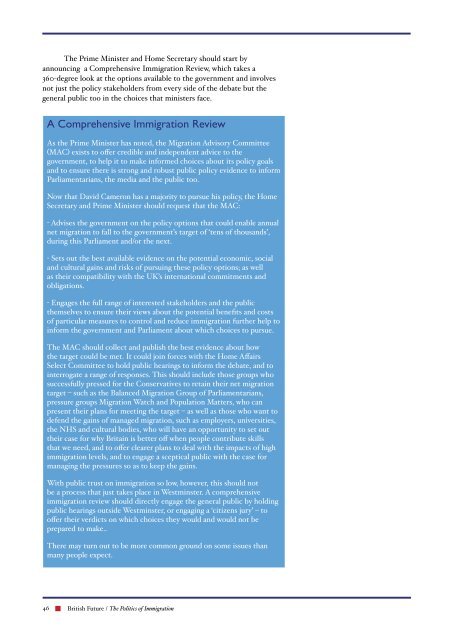THE POLITICS OF IMMIGRATION
The-politics-of-immigration
The-politics-of-immigration
You also want an ePaper? Increase the reach of your titles
YUMPU automatically turns print PDFs into web optimized ePapers that Google loves.
The Prime Minister and Home Secretary should start by<br />
announcing a Comprehensive Immigration Review, which takes a<br />
360-degree look at the options available to the government and involves<br />
not just the policy stakeholders from every side of the debate but the<br />
general public too in the choices that ministers face.<br />
A Comprehensive Immigration Review<br />
As the Prime Minister has noted, the Migration Advisory Committee<br />
(MAC) exists to offer credible and independent advice to the<br />
government, to help it to make informed choices about its policy goals<br />
and to ensure there is strong and robust public policy evidence to inform<br />
Parliamentarians, the media and the public too.<br />
Now that David Cameron has a majority to pursue his policy, the Home<br />
Secretary and Prime Minister should request that the MAC:<br />
- Advises the government on the policy options that could enable annual<br />
net migration to fall to the government’s target of ‘tens of thousands’,<br />
during this Parliament and/or the next.<br />
- Sets out the best available evidence on the potential economic, social<br />
and cultural gains and risks of pursuing these policy options; as well<br />
as their compatibility with the UK’s international commitments and<br />
obligations.<br />
- Engages the full range of interested stakeholders and the public<br />
themselves to ensure their views about the potential benefits and costs<br />
of particular measures to control and reduce immigration further help to<br />
inform the government and Parliament about which choices to pursue.<br />
The MAC should collect and publish the best evidence about how<br />
the target could be met. It could join forces with the Home Affairs<br />
Select Committee to hold public hearings to inform the debate, and to<br />
interrogate a range of responses. This should include those groups who<br />
successfully pressed for the Conservatives to retain their net migration<br />
target – such as the Balanced Migration Group of Parliamentarians,<br />
pressure groups Migration Watch and Population Matters, who can<br />
present their plans for meeting the target – as well as those who want to<br />
defend the gains of managed migration, such as employers, universities,<br />
the NHS and cultural bodies, who will have an opportunity to set out<br />
their case for why Britain is better off when people contribute skills<br />
that we need, and to offer clearer plans to deal with the impacts of high<br />
immigration levels, and to engage a sceptical public with the case for<br />
managing the pressures so as to keep the gains.<br />
With public trust on immigration so low, however, this should not<br />
be a process that just takes place in Westminster. A comprehensive<br />
immigration review should directly engage the general public by holding<br />
public hearings outside Westminster, or engaging a ‘citizens jury’ – to<br />
offer their verdicts on which choices they would and would not be<br />
prepared to make..<br />
There may turn out to be more common ground on some issues than<br />
many people expect.<br />
46 British Future / The Politics of Immigration


